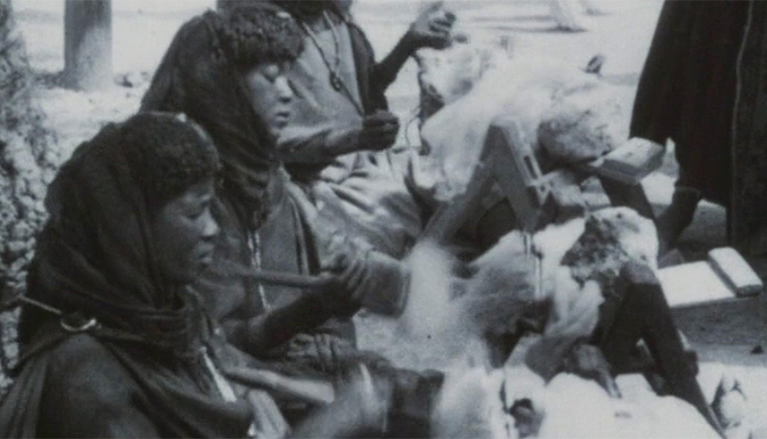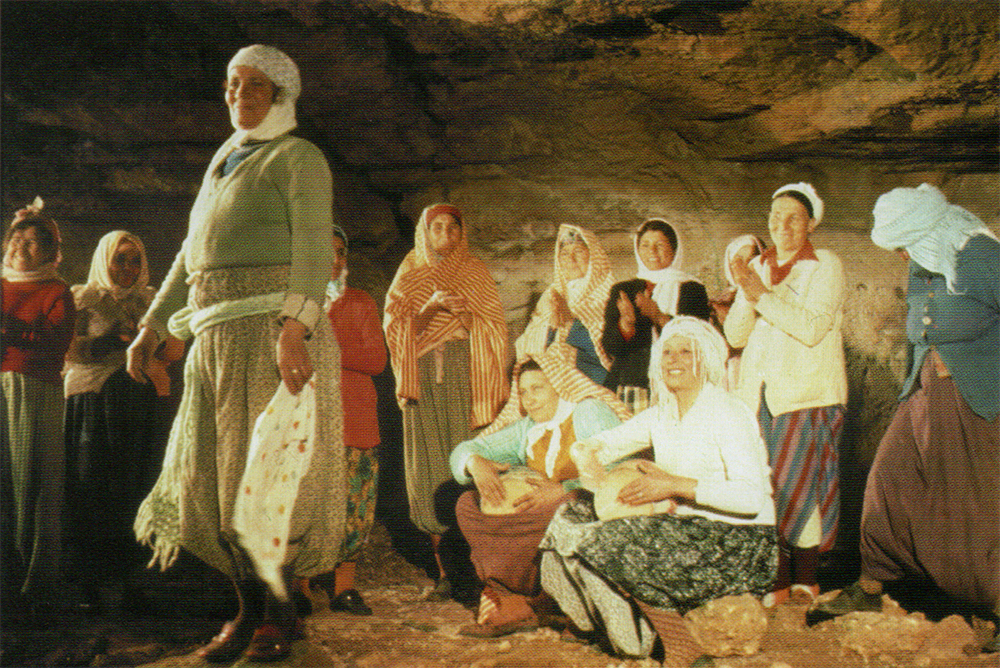Traslation by Luigina D’Introno
Assia Djebar is not a spokesperson, but a close to and against activist. She was born as Fatma Zohra Imalayène in Cherchell, Algeria, to an Arab family. Three languages accompany her on her journey as a writer and filmmaker: Berber, spoken by her grandparents, a language she sees as a symbol of resistance, Arabic spoken by her mother, and French, the country’s official language, a language she defines as impartial despite being the language of the conqueror. For example, if I didn’t know you, or because I am a woman, even if you were Algerian I would speak to you in French, because it is neutral. I mean it is less familiar, less intrusive. Neutral is impersonal and women have to be very discreet in Arab society1. During the turmoil in her country, she supported the struggle for independence, finding in history a light that accompanies her throughout her production. Mistrustful of her own old liner and conservative government, she began to find solace in hidden stories, marching on the narrative of Algerian women. Silenced women, hidden behind their homes that Djebar tried to bring out in their plurality and independence. It is something unspoken that overflowed in the 1980s through films such as La Zerda ou les chants de l’oubli in which she subverted the gaze of the colonised people by using archive footage of surviving Algerian traditions. Colonisation has plunged the Algerian people into an astonishing silence that the tirelessly repeated noise and fury of its history cannot fill. It was urgent to invent our own images. Cinema, like literature and culture in general, had an important role to play in this reparation process2.

Assia Djebar, La Zelda ou les chants de l’oubli, 1982. From PesaroFilmFest
However, it is with La Nouba des femmes du Mont Chenoua, from a few years earlier, that she achieves the rewriting of a shattered story about women. Wassila Tamzali writes of herself as the only woman in Algiers to have realised back in the 1970s how much the country needed a free female space, a space that the filmmaker sees passing through the walls of the house, the veil and the ban on speech. It was a feminism that was distant from white and French feminism, a movement that did not concern women’s Algeria, that did not care because men and women wanted the same thing.
I realized that the woman was forbidden any relationship to the image. While her image cannot be taken, she does not own it either. Since she is shut away, she looks on the inside. She can only look at the outside if she is veiled, and then, only with one eye. I decided then, that I would make of my camera this eye of the veiled woman3.

Assia Djebar, La nouba des femmes du Mont Chenoua, 1977. From Sabzian
So at that point, the protagonist together with her director began a journey back through the Berber mountains in search of the ‘Mothers’ who took part in the Algerian war of independence, to find the sounds of ‘torn memory’. A complex, long and tumultuous film that carries with it the voices of the peasant women of Chenoua who, unlike city people, the men and women in the countryside are capable of giving you oceans of pain in very sober and dry words… Perhaps because it was a repeated, a daily kind of pain? Then it’s up to you to feel, in some detail of the transmission – because in the field of cinema I consider myself a simple transmitter – the gap that opens onto other things. The little things are the true elements of the transmission. Through tiny bits – the inflection of a voice, unexpected tears, hesitation – that introduce you to the true, secret history of people. Words too..4 explains the director.
Because of its fragility and poetic style, Djebar’s film has been accused of being a waste of its fortunes. A film stolen from Algerian women and not about liberation through the war of independence and the building of the country. A woman looking at another woman, an intimate film where the bowed head was replaced by an upright body, on the run, on a mission.
But why did the feminists of the Cinémathèque Algérienne reject it? It is a self-reflexive and poetic film, something that a woman in the heart of the revolution could not afford. They had not been given the honour of having fought the struggle for independence alongside the men. They had been ruthless and courageous during the conflict between French colonists and Algerian independence fighters led by the NLF (National Liberation Front) between ‘54 and ’62. Their crucial role allowed the army to operate on several fronts because they were invisible and unsuspected to the guards, something that Djebar herself realised but the women did not want to guess yet. They were vehicles for explosives and bombers from the Casbah to the centre of Algiers, but this role disappeared with the war.
They returned to being confined between Berber culture and the objective alliance between their Arab husbands and the men who colonised them5.

Assia Djebar, La nouba des femmes du mont Chenoua, Algeria, 1977
This triple alliance did not protect them. Although they did not want to declare war against their men, it was them who had ganged up against them. The Algerian writer positions herself as against something. Against a patriarchal and politically incorrect system. Against a system aimed at the subjugation and enslavement of women. The family code itself, drawn up in 1984, had been a hard-earned goal for women gained during twenty-two years of struggle, but it immediately turned out as failing.
A woman did not own her clothing, her voice, her presence. She does not own the right to divorce, different from her husband, nor the right to medical choices about her children. She has no right to inherit the man’s half. Her contribution to the estate is less than that of her husband’s male relatives or her deceased father. Despite the enormous historical changes that have taken place in Algeria, the place occupied by women, although it has undergone significant mutations, is still certainly caged in cultural legacies that are still difficult to overcome6, the writer Tamzali explains.
Women’s political, muffled and scarred speech emerges in feminist Djebar’s novels like in Far from Medina, a collection of Arab testimonies from the first centuries through which she extrapolates the memories of imprisoned women. Her instantly incorruptible work seeks an all-female narrative in the determination of warriors, of subjugated survivors, but also of ordinary women made fragile by a misogynistic society that wanted them to be silenced. Her literary and filmic production is a testimony to the struggles for the emancipation of wives, daughters and granddaughters who have no place in the debate, in the central square of the world. Assia Djebar’s work is a continuous movement, a tumult of feet treading the ground in multiple directions. A continuous quest for doors, for windows to climb through and to shout with one’s own voice from, with one’s own strength. The women she frees through the story can now resume their dreams and ambitions from exile.
Assia Djebar was an Algerian writer, poet and filmmaker. He was born in 1936 in Cherchell, Algeria. She has published feminist books and essays such as Femmes d’Alger dans leur Appartement, 1980, Fantasia: An Algerian Cavalcade, 1985, Lejos de Medina, 1991. She has directed La Nouba des femmes du Mont Chenoua, 1977 e La Zerda ou les chants de l’oubli, 1979.
Wassila Tamzali was born in Béjaïa, Algeria, in 1941. She is a writer, feminist, journalist and lawyer. Since 1979 she has been involved in the UNESCO program for the rights of women in Islamic countries and against prostitution and trafficking of women. He has written books on Maghreb cinema such as En attendant Omar Guetlato (1975); and books on the Algerian War of Independence and on women such as Une education algerienne – De la rivolution à la decennie noire (2007), Une femme en colère (2009) e Burqa? (2010).
- Slate, Assia Djebar, gardienne de la langue française ↩︎
- Wassila Tamzali, Une éducation algérienne: De la révolution à la décennie noire, 2007 ↩︎
- Assia Djebar in African Women in Cinema blog, Algerian Women in Cinema, Visual Media and Screen Culture ↩︎
- Sabzian, A First Look, Assia Djebar, Wassila Tamzali, 1978 ↩︎
- Denise Brahimi, Femmes Arabes et Soeurs Musulmanes, Paris, Éditions Tierce, 1984 ↩︎
- Wassila Tamzali, Une éducation algérienne: De la révolution à la décennie noire, 2007 ↩︎

